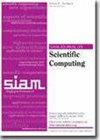A Fast Algebraic Multigrid Solver and Accurate Discretization for Highly Anisotropic Heat Flux I: Open Field Lines
IF 2.6
2区 数学
Q1 MATHEMATICS, APPLIED
引用次数: 0
Abstract
SIAM Journal on Scientific Computing, Volume 46, Issue 3, Page A1821-A1849, June 2024.Abstract. We present a novel solver technique for the anisotropic heat flux equation, aimed at the high level of anisotropy seen in magnetic confinement fusion plasmas. Such problems pose two major challenges: (i) discretization accuracy and (ii) efficient implicit linear solvers. We simultaneously address each of these challenges by constructing a new finite element discretization with excellent accuracy properties, tailored to a novel solver approach based on algebraic multigrid (AMG) methods designed for advective operators. We pose the problem in a mixed formulation, introducing the directional temperature gradient as an auxiliary variable. The temperature and auxiliary fields are discretized in a scalar discontinuous Galerkin space with upwinding principles used for discretizations of advection. We demonstrate the proposed discretization’s superior accuracy over other discretizations of anisotropic heat flux, achieving error [math] smaller for anisotropy ratio of [math], for closed field lines. The block matrix system is reordered and solved in an approach where the two advection operators are inverted using AMG solvers based on approximate ideal restriction, which is particularly efficient for upwind discontinuous Galerkin discretizations of advection. To ensure that the advection operators are nonsingular, in this paper we restrict ourselves to considering open (acyclic) magnetic field lines for the linear solvers. We demonstrate fast convergence of the proposed iterative solver in highly anisotropic regimes where other diffusion-based AMG methods fail.
高各向异性热通量 I 的快速代数多网格求解器和精确离散化:开阔场线
SIAM 科学计算期刊》,第 46 卷第 3 期,第 A1821-A1849 页,2024 年 6 月。 摘要我们针对磁约束聚变等离子体中的高度各向异性,提出了一种新颖的各向异性热通量方程求解技术。此类问题带来两大挑战:(i) 离散化精度和 (ii) 高效隐式线性求解器。我们通过构建一种具有出色精度特性的新型有限元离散化方法,同时应对这两大挑战,该方法是为平动算子设计的基于代数多网格(AMG)方法的新型求解器方法量身定制的。我们以混合形式提出问题,将定向温度梯度作为辅助变量。温度场和辅助场在标量非连续 Galerkin 空间中离散,上卷原理用于平流离散。我们证明了所提出的离散方法比其他各向异性热通量的离散方法具有更高的精度,在封闭场线中,各向异性比为[math]时,误差[math]更小。对块矩阵系统进行重新排序和求解时,使用基于近似理想限制的 AMG 求解器对两个平流算子进行反演,这对于平流的上风非连续 Galerkin 离散化尤为有效。为确保平流算子是非奇异值,本文限制线性求解器只考虑开放(非循环)磁场线。我们证明了所提出的迭代求解器在高度各向异性环境中的快速收敛性,而其他基于扩散的 AMG 方法却在这种环境中失效。
本文章由计算机程序翻译,如有差异,请以英文原文为准。
求助全文
约1分钟内获得全文
求助全文
来源期刊
CiteScore
5.50
自引率
3.20%
发文量
209
审稿时长
1 months
期刊介绍:
The purpose of SIAM Journal on Scientific Computing (SISC) is to advance computational methods for solving scientific and engineering problems.
SISC papers are classified into three categories:
1. Methods and Algorithms for Scientific Computing: Papers in this category may include theoretical analysis, provided that the relevance to applications in science and engineering is demonstrated. They should contain meaningful computational results and theoretical results or strong heuristics supporting the performance of new algorithms.
2. Computational Methods in Science and Engineering: Papers in this section will typically describe novel methodologies for solving a specific problem in computational science or engineering. They should contain enough information about the application to orient other computational scientists but should omit details of interest mainly to the applications specialist.
3. Software and High-Performance Computing: Papers in this category should concern the novel design and development of computational methods and high-quality software, parallel algorithms, high-performance computing issues, new architectures, data analysis, or visualization. The primary focus should be on computational methods that have potentially large impact for an important class of scientific or engineering problems.

 求助内容:
求助内容: 应助结果提醒方式:
应助结果提醒方式:


